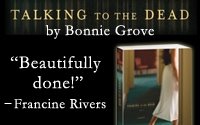
My deepest apology for posting so late in the day today. I was up late with family and friends celebrating Canada Day. Fireworks! Ooooo, ahhhh.
But, as promised! The second half of Janet's wonderful contribution, Razzle Dazzle Titles. Read the first post
(here, Janet adds to the first two "check points" of good titling):
--Does the title pinpoint your audience? Here are two examples: Hedges: Loving Your
Marriage Enough to Protect It, and Instant Message from God for Teens.
Marriage Enough to Protect It, and Instant Message from God for Teens.
--Does the title set itself apart from other titles for the same audience? One of my clients suggested this title for a book on parents with prodigals (a topic that has inspired many books so the title has to immediately convey what’s different about this book). The author suggested Helping Parents Get Over Their Wild Child. I countered with Ready? Set? Let Go! How Parents of Prodigals Can Get on With Their Lives. Both of us were working to convey what was unique about this book’s message. You be the judge as to which one of us succeeded better.
--Is it memorable? Author Julie Barnhill said, “I think titles should be thought of much in the same manner as the names of children. You want something that rolls off the tongue.” Can a potential buyer remember it long enough to get to the bookstore to ask for it? An author had written a playful novel about a group of church ladies who had had it with planning Christmas for everyone so they ran away to Jamaica. The original title? The Christmas Club. The final title, which the publisher came up with: Jamaican Me Crazy. The Christmas Club is unlikely to stick in my brain, but Jamaican Me Crazy is so clever, I can get stuck in a traffic jam and still remember it by the time I reach the bookstore.
--Is it clever? Sometimes a clever title can cause a book browser to pick it up. Anita Renfroe’s The Purse-Driven Life (which came out during The Purpose-Driven Life phase) is an eye-catcher.
Other hints for making your title stand out:
--Use alliteration. Bubble’s Betrothed is a general market mystery about a former hairdresser turned reporter.
--Use a line from the book. Are You There, God? It’s Me, Margaret is a classic example of how inspiration for the title can be tucked away in the book itself.
Where do you get ideas? They’re everywhere. Here’s a sample I found in my church’s bulletin one Sunday: Loved the Wedding, Invite Me to the Marriage. Love, God.
Other sources might be song lyrics, movie titles, a play off of other titles, or twists on commonly used phrases. Often it’s a good idea to create something new from one of these sources by playing off of the phrase rather than just using it.
Recently I saw a title for a book that recounted the history of marriage from Adam and Eve to the Renaissance and beyond. Our minds would immediately go the phrase “I do” for the title. Well, this breezy and irreverent book was entitled, I Don’t: A Contrarian History of Marriage.
Don’t be afraid to be playful when you’re brainstorming your next title. For sure, don’t be predictable. And do give your title some test runs with friends and family. Their facial expressions will tell you all you need to know.
Now, get out there and razzle-dazzle your reader!
*********
Janet, thank you for this great article! I'm inspired!
Okay, faithful blog readers - how have you been inspired by this article? Have you come up with the perfect title for your WIP? Share your ideas, titles, and successes here.
I'll be sending all of your comments on to Janet, who will reply all at once. I will post Janet's response to all your comments on a separate post. So, ask away! Janet is waiting to hear from you!
I bid you good writing.












